Protect your data
This site uses cookies and related technologies for site operation, and analytics as described in our Privacy Policy . You may choose to consent to our use of these technologies, reject non-essential technologies, or further manage your preferences.
- Resume and Cover Letter
- How to Create a Resume With...

How to Create a Resume With No Education
5 min read · Updated on December 17, 2021

Once you know how to effectively highlight your skills and experience, a resume with no education won't keep you from getting hired.
You've found a job you know you're qualified for based on your skills and experience — but you don't have the right education or lack a specific degree. Essentially, you have a resume with no education relevant to the position. Should you pass over that job? Absolutely not!
According to a 2019 TopResume survey asking employers to rate what they desire in their candidates, education was at the bottom of the list. Instead, their preferences were potential (45 percent), experience (37 percent), personality (16 percent), and finally education (only 2 percent).
Given this data, a lack of education shouldn't keep you from considering a job you could otherwise perform — and perform well. You just need to put in a little extra effort to create a resume that shows you're truly qualified despite your less-than-compatible educational background.
Choose the right resume format
If you need to create a resume with no formal or relevant education, use a hybrid resume format that combines the best parts of a chronological resume — which shows your work experience in reverse order — and a functional resume, which highlights your skills and achievements.
Also, make sure to put your education section at the end of the resume so that the hiring manager will see how much you have to offer before they see that you don't necessarily meet all of their educational criteria. The goal? To have them find the first parts of your resume so impressive that your education won't matter.
Prepare a persuasive professional summary
The professional summary (versus an objective statement) at the top of your resume is where a hiring manager gets their first impression of you. Briefly state the key experience and skills you possess that make you a great fit for the role. Try to match the job description as closely as possible, using the same keywords and phrases when possible.
Emphasize your strongest relevant experiences
When it comes to your professional experience, make every word count. Provide specific details of your experience doing the same job or similar jobs, including accomplishments such as improving sales, completing projects at or under budget, or successfully supervising a team or department. List the skills you have that match the job description and use language that shows off your industry knowledge.
Basically, help your potential employer see that you would be such an asset to their operation that your lack of formal education or preferred education specific to that job doesn't really matter. You already have the tools to be a valuable employee; you just need to make sure you're highlighting them correctly.
Support your credentials
Make sure you are listing any key achievements or credentials within your professional experience, education, or skills section that are worth knowing. This can include:
Publications: List any published materials that prove you're an expert in your area. These can include books, white papers, and blog posts.
Presentations: Describe any public speaking you've done in your field that you think would be important to a hiring manager. Along with proving your expertise, it shows that you are an effective communicator.
Awards: State any awards you've received for outstanding accomplishments or dedication in a similar job role or in the industry in general.
You can also consider listing any professional memberships you belong to that are relevant to your field, along with listing any volunteer work on your resume done either while employed or unemployed. Give your years of involvement as well as accomplishments or leadership roles you held.
Keep your education section positive and proactive
When creating a resume with no education to list, highlight the ways you've taken the initiative to learn and grow in your field rather than focusing on an incomplete or interrupted education.
List any job-related training you've completed, either through your own initiative or your company's direction. These can include apprenticeships, conferences, seminars, online classes, and certification courses. In some cases, this more recent training is more impressive to an employer than a dated degree and no other training.
If you're in any kind of educational program, show where you are in the process. For example:
COLLEGE (City, State)
Enrolled in Bachelor of Science program, major in [ ... ], degree expected [date]
You can also provide any formal education you've done, even if you're not currently in a program. Ideally, list this after all other training you've done.
Earned XX credits toward a […] degree, [dates attended]
Creating a resume using these tips can help you get past the initial round of screenings and catch a hiring manager's attention since the spotlight will be on your assets and potential, rather than your education. From there, you can follow up with specific details during the interview.
While some employers may immediately reject you because you don't meet specific educational requirements, others will consider you a truly viable candidate because of your skills, experience, initiative, and past success. Those are the companies you can count on to value what you bring to them in the first place.
Not sure if your education section is formatted correctly to help you land the interview? Check today with a free resume review .
Recommended Reading:
How to Make a Great Resume With No Work Experience
How to Be a Great Candidate Even If You're Under-Qualified for the Job
Ask Amanda: What's the Best Way to List Education on a Resume?
Related Articles:
Do Hiring Managers Actually Read Cover Letters?
From Bland to Beautiful: How We Made This Professional's Resume Shine
7 Signs Your Resume is Making You Look Old
See how your resume stacks up.
Career Advice Newsletter
Our experts gather the best career & resume tips weekly. Delivered weekly, always free.
Thanks! Career advice is on its way.
Share this article:
Let's stay in touch.
Subscribe today to get job tips and career advice that will come in handy.
Your information is secure. Please read our privacy policy for more information.
![how to write a cv with no education How to write a resume when you have no education [high school or college]](https://www.visualcv.com/static/759484e76e620bca344714a8b70c05bf/47ddf/how-to-write-a-resume-with-no-education.jpg)
How to write a resume when you have no education [high school or college]
Landing your dream job can seem impossible when you don’t have a degree, and even more so if you haven’t graduated high school. As long as you can learn how to write a resume with no education, however, you should never hesitate to apply for the job you want. Plenty of people have had successful careers without any formal education, and you shouldn’t let this one thing hold you back.
As long as you have the right skills, the right experience, and a willingness to learn, you can succeed in any field without a degree. Writing a great resume with no education is only the first step.
This article will discuss:
- Writing a resume with no education
- Listing education on a resume with no degree
- Writing a resume with no high school education
- Writing a resume with no college education
- Deciding which sections to include on your resume
- Formatting your resume
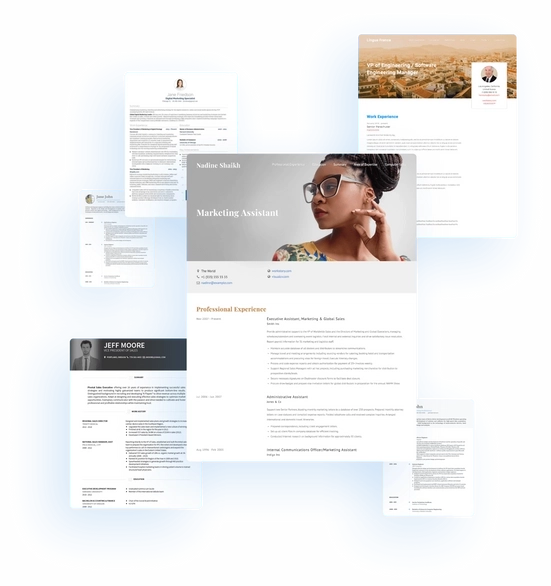
- Pick the right resume format
Most resumes use a reverse-chronological format, with a Work Experience section that lists jobs from most recent to least recent. If you have some impressive experience to highlight, this format will work for you. A reverse-chronological resume allows you to focus your work experience over everything else, which can help when you don’t have much education to show.
If you would like to highlight skills over experience, you can also try the combination format . This resume format features a prominent Skills section, where you can highlight your best skills and competencies, as well as a reverse-chronological Work Experience section. If you have a strong skill set that you would like to showcase, you may want to use a combination resume.
- What sections to include on your resume when you have no education
The sections you should include on a resume with no education are:
- Contact information : Your name and contact details
- Summary : A brief summary of your key qualifications
- Skills : A detailed list of the skills that make you suitable for the job
- Work experience : A reverse-chronological list of previous positions, with job descriptions
- Education : Even if you haven’t completed any formal education, you can list your ongoing or incomplete education
For many job-seekers, these sections will be enough. If you have other qualifications you would like to highlight, however, you can also include:
- Awards : Any awards, achievements, or honours you have received
- Certifications : Licenses and other proof that you are able to do the job
- Volunteering Experience : Past or current volunteer positions
- Memberships : If you belong to any professional organizations, you may want to list them
- Interests and Activities : While this section is not necessary, if you participate in any impressive clubs or teams, it can help fill out your resume
The exact details of your resume will depend on your career, your experience, and the job you are applying for, but any information or qualification you think will improve your application should fit in one of these sections.
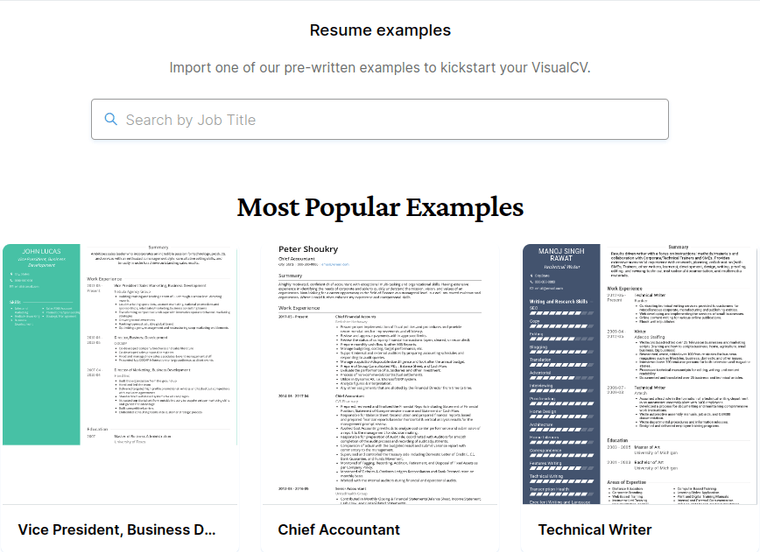
- How to write a resume with no high school education
Writing a resume with no high school education can be a challenge, but it can be done with the right strategy. Many people have had successful careers without graduating high school, and they all had to start somewhere.
When you're writing a resume with no high school education, you'll need your other resume sections to do the heavy lifting. Focus on your skills and experience instead of your education.
You should still include an Education section, however. If there is no Education at all, the employer or applicant tracking system may think that you have uploaded an incomplete resume and reject your application. It’s better to include the section, even if it requires some explanation.
If you are still in high school, or are pursuing your GED as an adult, you can note this in your Education section. Simply include that your education is in progress, and list the date that you expect to graduate.
If you dropped out of high school, you can list the dates you attended and note that your certification was incomplete with the dates you attended. Then, you can list any other education you may have received. This might be workshops, seminars, apprenticeships, online courses, and any other training. Self-directed education and on-the-job training can be very impressive to employers.
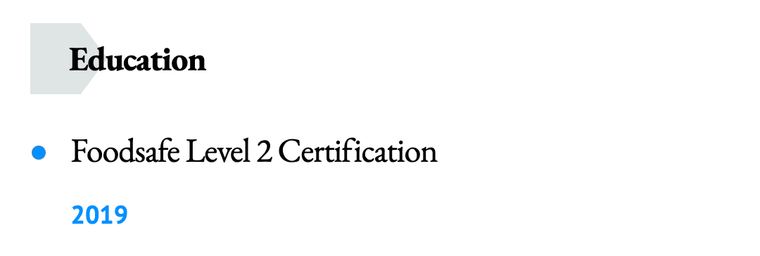
- How to write a resume with no college education
Writing a resume with no college education means putting your skills, experience, and achievements in the foreground. While you should still list your education, it will not be the focus of your resume.
If you never attended college or university, simply list your high school education.
If you started a degree but didn’t finish it, you can include the dates you attended and describe some coursework as long as you note that your degree was not completed. You can make even an incomplete degree sound impressive if you describe the courses, research topics, or important projects you were a part of during your time in college.
You can also include non-college education, such as certificates, licenses, workshops, online courses, and more. All of your education is important to your career, even if it wasn’t at a college or university.
- How to write a resume with no education: a step-by-step guide
Writing a resume with no education will take some effort, but by following these steps, yours will be done in no time. Here is a step-by-step guide to writing a resume with no education.
#1. List your contact information
Your contact information should be right at the top of your resume. Your contact information should include:
- Phone number
- Email address
- City and state/province
- Relevant social media
No matter what else you include on your resume, your contact information has to be easy to find. Your resume won’t do you any good if hiring managers don’t know how to contact you.
Make sure your email address, as well as any social media accounts you link to, are professional and appropriate for work. If you link to a Twitter or Facebook account, for example, double check to make sure your online behaviour will be acceptable to any company who sees it.
When you have no education, an online portfolio can be an important asset. Linking to a Github profile or online profile with examples of your work is a great way to show that you can do the job, even if you are self-taught. If you have impressive work that you can link to online, linking to it in your contact information is a good idea.
#2. Write a resume summary
A summary is a short paragraph or bulleted list that highlights:
- who you are as a candidate
- what skills and specialties do you bring to the job
- your key achievements or qualifications
A resume summary is an essential part of a resume with no education. It's an opportunity to make a great first impression with your resume and underline what you can bring to the company.
Your summary should come right at the top of your resume, and it should be good enough that anyone who reads it wants to keep reading.
#3. Highlight your skills
When you don’t have much education to discuss, your skills section is a very important part of your resume. In fact, this may be where you want to put most of your effort. A great Skills section can show that you have what it takes to succeed at the position, even if you learned these skills yourself.
To really emphasize skills, you can create a heading for each skill type, with examples of skills, tools, or achievements underneath. A Skills section like that could look like this:
Professional skills
Graphic design
- Designed logos, gifs, animations, and branded content for website
- Proficient with Adobe Suite, Crello, and CorelDraw
- Developed various promotional materials including catalogues, flyers, business cards, posters, product packaging, and merchandise
Web development
- Expert in HTML/CSS, JavaScript, Ruby, PHP, Python, and Java
- Front-end development for eCommerce websites
- Developed documentation on ReactNative to onboard new team members
SEO & Content writing
- Used Moz and Ahrefs to research keywords and topics for clients
- Write highly-technical, SEO-friendly content for company blog
- Used targeted keywords and pillar content to increase website traffic by 400%
- Managed team of seven people for content management and web development department
- Trained and mentored interns and junior developers
If you prefer something shorter, however, you can simply list your skills in a single bulleted list. The exact format of your Skills section will depend on your specific resume.
#4. Describe your work experience
A robust work experience section is vital for a resume with no education. Alongside the skills section, the work experience section will form the main body of your resume.
You should list previous positions in your work experience in reverse-chronological order, beginning with your most recent job and working backwards. Each item in your work experience should contain:
- Position or job title
- Company name
- Bulleted list of accomplishments and duties in the role
Each job description is very important to the success of your Work Experience section. As you describe each role, try to use quantifiable achievements as much as possible, such as sales numbers or customer success scores. This will make your experience sound credible. You should also use active language as much as possible so that you sound like a productive employee with leadership abilities.
A Work Experience section might look like this:
Work Experience
Game programmer.
17-Bit , Seattle, WA June 2016 - March 2022
- Write code for games using C++ and Java for domestic and international market
- Extensively test code and game before beta release
- Work on several projects simultaneously, communicating with team and management to ensure deadlines are achieved
- Write code reviews and compiled documentation
- Supervise and mentor junior devs and interns
- Assist CGI team in research and development of new technologies
ABC Games , Lynchburg, VA Oct 2010 - June 2016
- Recruited from the internship in bug testing department
- Provided feedback and testing for several successful games
- Developed several simple first-person shooters that reached the top 20 on the AppStore
- Coding 2D and 3D graphics for our flagship puzzle game
#5. List awards and honours
Your work history and skills will be doing most of the work in your resume. If you have any other qualifications you would like to showcase, however, you should create a section for them as well.
If you have received any awards, honours, or rewards in previous positions, you can describe them in an Awards section. This is a great way to show that you have done well, and been recognized for it.
Awards & Achievements
- Digital Marketing Awards: Designer of the Year 2019
- Achieved promotion to manager at DigiMarketing in 2020
- Feature articles on marketing in Forbes, Advertising Age, and Marketing Week
- Improved traffic by 350% for well-known challenger shoe brand, resulting in seven-figure revenue growth
#6. Education
Exactly how important your education is will depend on your industry.
If you want a job as a doctor or professor, for example, your education is very important. In fact, you will likely need to get a degree before you apply for one of these jobs.
In other careers, however, you don’t need a formal education to succeed. For most jobs, your skills and experience are much more important than your education. As long as you have skills you can showcase, you don’t need to rely on your education to land a job.
There are a few ways you can approach writing a resume with no education, depending on your circumstances.
1. List incomplete or in-progress credentials
If you are still in school, you can note this in your education section. Simply explain that you are still pursuing your education and note the date you expect to graduate.
If you started a degree that you don’t intend to finish, you can still mention it in your resume. You may not want to use too much resume space on an unfinished degree, but listing some relevant courses, projects, or research areas can be an asset to your resume, even if you decided not to complete your degree.
2. List alternative education or on-the-job training
Some of the most important education comes from less formal educational settings. You can list certifications, conferences, bootcamps, workshops, on-the-job training courses, online courses, and more in your education section. In some cases, education that you pursued on your own can be more impressive and more relevant than what you learned in school.
In the example below, the candidate includes their unfinished university courses and a 12-week bootcamp. The bootcamp is more recent, more relevant, and more impressive, so it is listed first.
Flatiron Coding Bootcamp New York City (online)
- 12-week course (Spring 2021)
- Software development
BSc in Mathematics with Computer Science (incomplete) MIT, Cambridge, MA 2019 - 2020
Earned credits towards a degree. Coursework included:
- Introduction to Programming 1 & 2
- Fundamentals of Computation
- Data Science
- Operating Systems
- Tips for writing a resume with no education
Once all of your sections are in place, you can begin writing your resume. Here are some tips to get started:
Use a professional resume template
One of the best ways to ensure your resume looks perfect is to use a resume template. To make sure your skills and education get the attention they deserve, a two-column template like VisualCV’s Gallant or Slate templates are ideal for resumes with no education. You can place your Skills and Experience in the larger main column, and keep your Education section shorter in the narrower side column.
Some candidates feel that they won’t get a job if they are truthful about their lack of education. However, even a resume with no high school education can get interviews when you have a great resume summary, skills, and work experience.
Lying about your education is a bad idea. These records are easy for employers to check, and you won’t get an offer if you get caught in a lie. Honesty is the best policy.
Apply, even if you don’t meet the stated requirements
Companies aren’t always as strict as the job posting would make them seem. The minimum requirements listed in the job posting are often more of a wish list than concrete requirements. You might be the right candidate, even if you don’t have the exact degree they requested.
As long as you are confident that you can do the job, there’s no reason not to apply. If your skills and experience have prepared you for the role, your resume will reflect this, even if you don’t have the education.
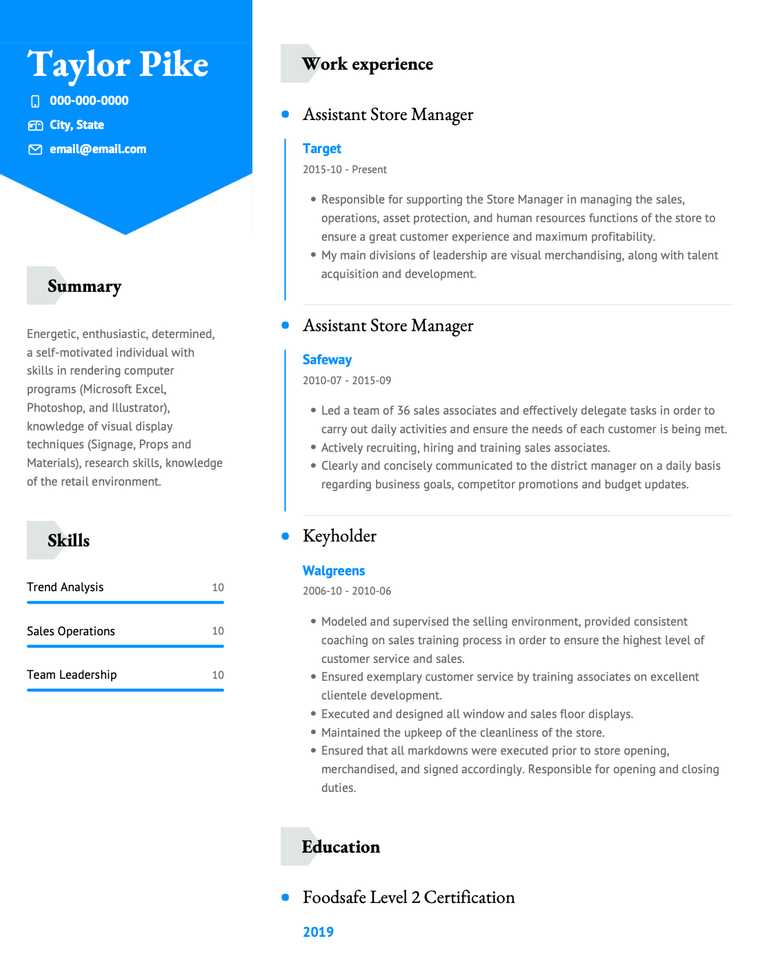
Community Success Manager & CV Writing Expert
Ben is a writer, customer success manager and CV writing expert with over 5 years of experience helping job-seekers create their best careers. He believes in the importance of a great resume summary and the power of coffee.
![how to write a cv with no education How to write a resume for an internship [with examples]](https://www.visualcv.com/static/de672c35bbdf3782c8cd0e4cd95cbc72/61ca5/how-to-write-a-resume-for-a-internship.jpg)
A great resume is an important part of a successful internship application.
June 20, 2022
A grad school CV is an important part of applying for post-graduate positions.
March 27, 2024

VP Marketing & Resume Expert

The good news: you're graduating! The bad news: now the job hunt begins. Thankfully, we've put together a guide for job hunting as a student.
May 27, 2022

Content Manager & Resume Expert
Copyright © 2024 Workstory Inc.
Select Your Language:
- Resume Templates
- Resume Examples
- Free Resume Builder
- How to Write a Resume
- Resume Format
- Resume Packs
- Cover Letter Templates
- Cover Letter Examples
- Free Cover Letter Generator
- How To Write a Cover Letter
- CV Templates
- CV Examples
- Free CV Maker
- Resume Help
- Cover Letter Help
- Job Interview
- Career Advice
Resume With no College Degree Example + Writing Tips
No degree? No problems. History knows plenty of highly successful college dropouts who banked on practical experience over formal credentials. Besides, enrolling in a university isn’t the only way to obtain a quality education — you’ve got online courses, professional certification programs, and coaching programs!
Employers also increasingly recognize that screening out applicants based on their degree doesn’t work in their favor. Almost half of US companies have already eliminated (or plan to remove) degree requirements for most positions. Among them are large employers like Walmart , IBM , and Dell Technologies among others.
Yet, you’re still required to provide a coherent resume as part of the job application. So do you best address your lack of a degree in a resume?
This post provides several working resumes without college degree examples, alongside actionable writing and formatting tips for each section.
Resume With no College Degree: Example (Word)
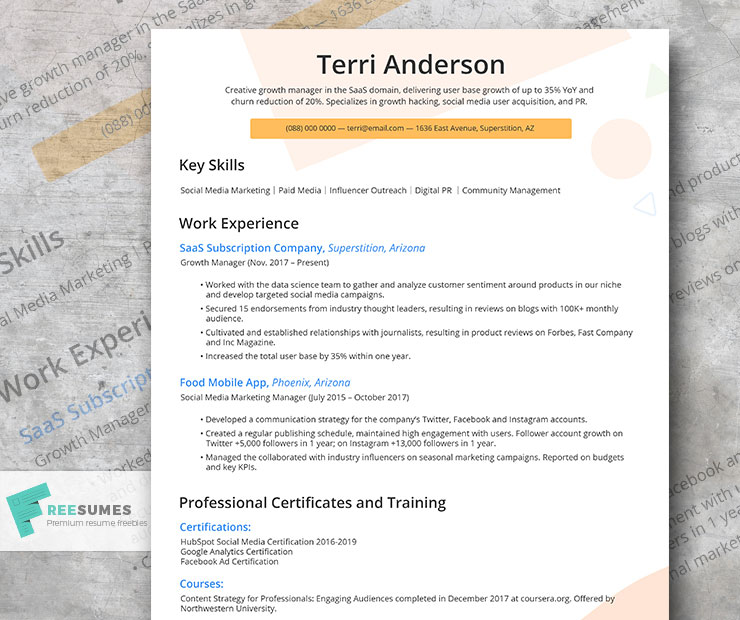
Download resume example (.docx)
No College Degree Resume Example (plain text)
Creative growth manager in the SaaS domain, delivering user base growth of up to 35% YoY and churn reduction of 20%. Specializes in growth hacking, social media user acquisition, and PR.
Key Skills
Social Media Marketing|Paid Media|Influencer Outreach|Digital PR |Community Management
Work Experience
SaaS Subscription Company, Superstition, Arizona
Growth Manager (Nov. 2017 – Present)
- Worked with the data science team to gather and analyze customer sentiment around products in our niche and develop targeted social media campaigns.
- Secured 15 endorsements from industry thought leaders, resulting in reviews on blogs with 100K+ monthly audience.
- Cultivated and established relationships with journalists, resulting in product reviews on Forbes, Fast Company and Inc Magazine.
- Increased the total user base by 35% within one year.
Food Mobile App, Phoenix, Arizona
Social Media Marketing Manager (July 2015 – October 2017)
- Developed a communication strategy for the company’s Twitter, Facebook and Instagram accounts.
- Created a regular publishing schedule, maintained high engagement with users. Follower account growth on Twitter +5,000 followers in 1 year; on Instagram +13,000 followers in 1 year.
- Managed the collaborated with industry influencers on seasonal marketing campaigns. Reported on budgets and key KPIs.
Professional Certificates and Training
Certifications:
HubSpot Social Media Certification 2016-2019. Google Analytics Certification Facebook Ad Certification
Content Strategy for Professionals: Engaging Audiences completed in December 2017 at coursera.org. Offered by Northwestern University. Influencer Marketing Strategy completed in April 2018 at coursera.org. Offered by Rutgers, the State University of New Jersey. Viral Marketing and How to Craft Contagious Content completed in June 2018 at coursera.org. Offered by Wharton School of Business.
Sample Resume Without College Degree But Credits
Lydia Price
Customer Success Manager for FinTech & EdTech Brands
Proactive CSM with strong people skills and a proven track record of improving business metrics. Reduced customer churn rates by 15% in one quarter for the personal finance management app. Maintained a 98% CSAT for managed customer accounts for a corporate learning platform.
Skills & Competencies
- Relationship management
- Digital community building
- Customer onboarding
- Customer retention
- Sales demos and presentations
- Deal management and negotiation
- Business analysis with Power BI
- Salesforce, HubSpot, Zendesk
Work Experience
Customer Success Manager FinTech Company Atlanta, GA May 2021-present
Joined as the first CSM hire to a Series B startup, offering personal finance and wealth management services to Millennial consumers. During the first year in the role, focused primarily on customer retention and churn reduction. Performed customer surveys and did sentiment and statistic analysis of responses. Conducted 1:1 user interviews to elicit new insights and pitch personalized service offers. Collaborated with the product management team on implementing new user retention features (investment goal tracking, automated savings, and round-ups, personalized market analysis digests). Achieved a 15% churn reduction in 12 months.
Junior CSM EdTech Company Atlanta, GA July 2019-April 2021
Worked with a roster of corporate eLearning clients (primarily in the manufacturing sector). Facilitated with preparation of product presentations, demos, and sales decks. Took an active part in negotiating B2B contracts through a 12-month sales cycle. Developed and pitched up-sell opportunities with a 25% conversion rate. After a year, was appointed to run the annual CSAT program.
Customer Support Specialist Ecommerce Business Atlanta, GA Sep 2018-June 2019
Handled customer support tickets via Zendesk for an online fashion retailer. Provided assistance with shipping tracking, product returns, and refund processing. Helped troubleshoot common payment and online ordering issues. Maintained an average customer review score of 95%.
Education:
University of Atlanta (2017-2018) Atlanta, GA BA: Business Administration Completed 45 credit hours in 2017-18 before dropping out.
Professional certifications:
- Customer Success Association – Certified Customer Success Manager (CCSM), issued in 2018.
- HubSpot – Inbound Sales Certification, issued in 2020.
Pro Tip: How to Put Education on a Resume Without a Degree
When it comes to listing education on a resume without a degree, several scenarios are possible.
First, you may have an unfinished degree . You’re still either pursuing it or decided that formal education isn’t for you. In this case, here’s how to style your education entry on a resume:
University of Toronto (2022 – 2023) Toronto, CA BS: Accounting — Completed 25 Hours Passed Grade 1 Certification Examination
An alternative scenario is that you’ve never even gone to college or a trade school (which is fine!). But it doesn’t mean the education section on your resume has to be blank.
In place of a formal degree, you can mention the following:
- Professional certifications and licenses: List all the credentials you have obtained to develop your skill set. Make sure to add the year and validity status if applicable.
- Professional training and courses: Create a curated list of programs, workshops, or masterclasses (online and in-person) that you’ve completed to show your competencies.
- On-the-job training: Mention relevant training your former employer(s) have administered.
Here’s how a sample education section on a resume may look like in this case:
- Professional Certificate in Content Design by UX Design Institute, issued in 2021.
- Google UX Design Professional Certificate, issued in 2022
- Online courses from Interaction Design Foundation: “Mobile UI Design”, “Design Thinking”, and “Information Visualization”.
How to Have a Great Resume Without a College Degree
For hiring managers, degrees are often a quick proof point of the candidate’s competency. Your goal is to emphasize your qualifications through other means: On-the-job experiences, skills, and work accomplishments. Focus on showing what you can do in practice, rather than just stating that you know the “theory”. Below are step-by-step tips for writing a resume without a college degree.
Open With a Compelling Resume Summary
Open your resume with a succinct and memorable resume summary pitching the value you can bring to the company. Think of it as a quick “punch line” that immediately grabs attention and brands you as an experienced and promising candidate.
Here are a few tips to help you brainstorm a solid summary statement:
- Attempt to write it after the work experience section.
- Create a quick list of 3-5 top achievements in your career based on what you wrote in the experience section.
- Re-read the job posting once again to determine which ones will be the most relevant to the employer.
- Don’t pitch what you “can do”. Instead, tell what you have already accomplished.
- Avoid vague, generic statements like these will make you sound like every other candidate applying for the job.
Read more about writing and styling a winning resume header .
Keep The Focus On Your Accomplishments And Experience
In the chronological resume format , the “Work Experience” section comes first. Thus, you’ll have plenty of room to make a solid impression before the HR scans to the bottom education part. Make this section the focal point of your resume. Speak to your accomplishments at every position you have held, quantifying them with relevant numbers whenever possible.
Showcase that you have solid hard and soft skills , highly relevant to the role. Prove that you are a solid performer that can bring a tangible impact to the new organization. Here’s a quick template you can use for that:
Position Name
Employer
Dates of employment
- List key skills and the results they helped achieve for the company
- Quantify your impact with numbers if possible to add extra weight
- Describe your growth and extra skills/experiences you’ve acquired.
Emphasize Alternative Education And Courses
Today formal education can be easily replaced with alternative training, offered by e-learning providers and MOOCs. Prestigious universities like Harvard , Stanford , Yale , and others offer free online courses and issue certificates of completion. Moreover, there are plenty of niche credentials you can obtain to complement your work experience and demonstrate that you have an up-to-date, hands-on skill set.
Add these to your education section to make it more authoritative. Also, you can list all the professional training you have obtained on the job, plus add masterclasses, conferences, industry certifications, and so on.
Finally, you can also list hobbies and interests if these are relevant to the job and help demonstrate your skill sets. For example, saying that you’re an avid marathon runner can strengthen your profile as a potential personal trainer.
Edit Your Resume for Impact
Once you are done with the initial writing, change gears for a while and then sit down to review your resume once again. Specifically, look for any gaps or vagueness that may leave the employer wondering about your expertise.
Sprinkle in additional power words and keywords (taken from the job description) to better articulate your competencies. Beef up your accomplishments and duties and re-check the texts for any grammar and formatting mistakes.
Pro tip: Use our free resume builder to create a well-formatted resume 2X faster. The app automatically guides you through each section and then generates a recruiter-friendly resume in Word or PDF format in one click.
Final Tip: Apply Even If Your Feel Underqualified
A lot of job posts come with specific education requirements in terms of BA/MA. Don’t skip on these if you feel that you are otherwise a strong fit. A lot of employers prefer candidates with strong hands-on experience to those with a less diverse background, but the said degree.
Thus, emphasize your skills and career progression to showcase what results you can drive for this particular company. The best way to do so is by writing a strong resume summary/career statement and placing a stronger accent on your skills.

Elena runs content operations at Freesumes since 2017. She works closely with copywriters, designers, and invited career experts to ensure that all content meets our highest editorial standards. Up to date, she wrote over 200 career-related pieces around resume writing, career advice... more
you might also like

Persuasive Preschool Teacher Resume Example And Tips

Plumber Resume Example and Writing Tips

Massage Therapist Resume Example and Tips

Travel Nurse Resume Example and Tips

Hostess Resume: Example and Actionable Tips
Leave a response cancel reply.
- • Managed a team of 7 engineers and 15 technicians ensuring optimal productivity and deadlines met.
- • Implemented Kaizen and Lean Six Sigma methodologies, improving overall efficiency by 25%.
- • Launched an initiative to turn production waste into a new revenue stream, generating $300K annually.
- • Conducted feasibility studies on new technologies for product line improvement.
- • Coordinated manufacturing activities for 3 product lines, involving staff of 50+.
- • Improved equipment efficiency by 20% through preventive maintenance procedures.
- • Reduced production defects by 15% by implementing new quality control measures.
- • Redesigned workflow to reduce bottlenecks and increased assembly speed by 30%.
- • Participated in process enhancement initiatives for semiconductor manufacturing.
- • Reduced cycle time by 15% through workflow optimization.
- • Improved efficiency by 10% by streamlining operational processes.
- • Managed process documentation, ensuring updated and accurate technical information.
5 No Degree Resume Examples & Guide for 2024
Your no degree resume must be a testament to your skills and experiences. Highlight the expertise you've acquired, not the diplomas you haven't. Show potential employers how you've successfully applied your knowledge in real-world situations. Use specific examples to demonstrate your worth and stand out from the crowd.
All resume examples in this guide
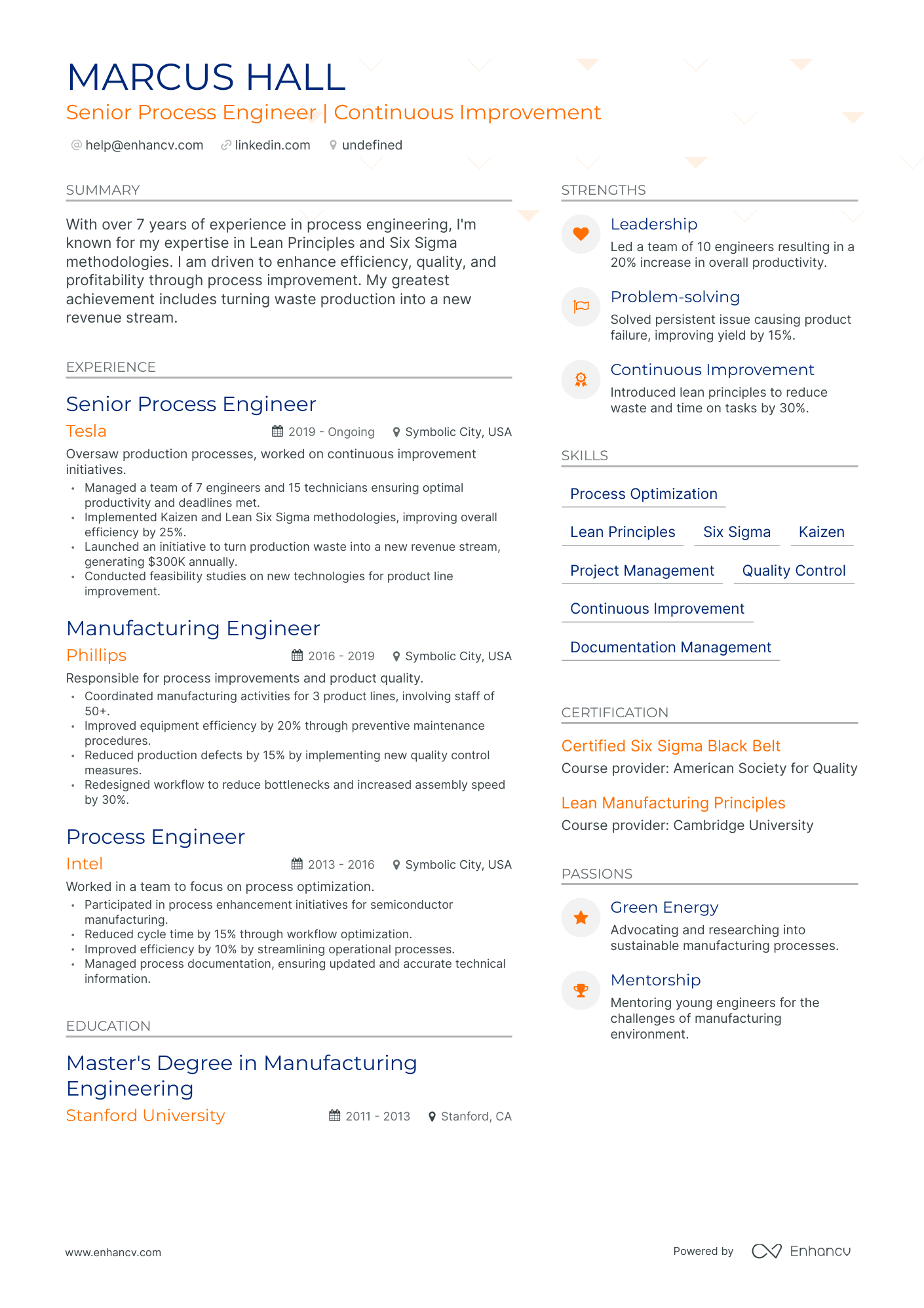
Traditional
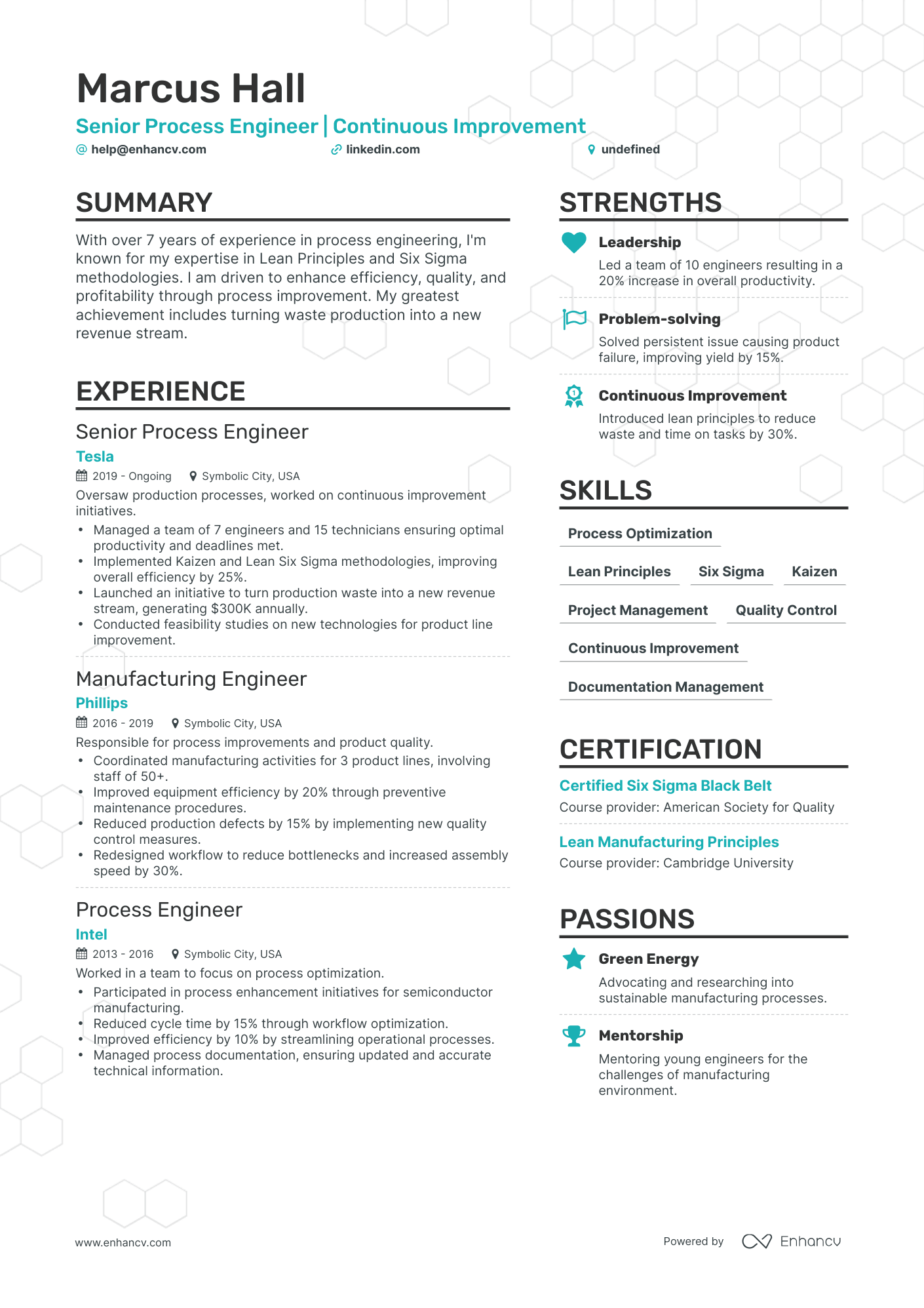
Resume Guide
Tips for refining your no degree resume format, writing your no degree resume experience, spotlighting your no degree hard and soft skills, highlighting no degree-specific certifications and education, choosing between a resume summary or objective, additional no degree resume sections for a personalized touch, key takeaways.

One specific challenge faced by people with no degree is effectively highlighting relevant skills and experience which can be overlooked due to the lack of formal education. Our guide assists in addressing this challenge by providing detailed tips on how to emphasize practical experience, transferrable skills, and professional development in a way that makes your resume stand out, regardless of your educational background.
Enhance your application for the no degree role with our concise guide on how to:
- Format your no degree resume, ensuring a balance between professionalism and creativity, in line with best practices.
- Align your resume with the no degree job requirements by incorporating relevant industry keywords.
- Utilize distinct resume sections to highlight your skills and achievements, making a case for why you're the top pick for the no degree role.
- Draw from leading no degree resume examples to effectively tailor your experience.
Recommended reads:
- Returning to Workforce resume
- Board of Directors resume
- Infrastructure Engineer resume
- Stock Broker resume
- User Researcher resume
The resume format sets the stage for your professional narrative. Ensure it:
- Adopts the reverse-chronological format , placing your most recent experiences at the forefront. This format is ideal for those with relevant and up-to-date experience.
- Features a clear headline, making it straightforward for recruiters to access your contact details, portfolio, or current role.
- Stays concise, ideally spanning no more than two pages, focusing on relevant experiences and skills.
- Maintains its layout by being saved as a PDF, ensuring compatibility with Applicant Tracking Systems (ATS).
Upload your resume
Drop your resume here or choose a file . PDF & DOCX only. Max 2MB file size.
Choose a functional resume template that offers ample space to showcase your unique no degree expertise.
Key sections to include in your no degree resume are:
- The header - with your contact details (like email and phone number), a link to your portfolio, and a headline.
- The summary (or objective) - highlighting the high points of your career so far.
- The experience section - limit yourself to six bullets per role to focus on specific results.
- The skills list - offering a balanced mix of your personal and professional talents.
- Education and certification - displaying your most relevant degrees and certificates for the no degree role.

What recruiters want to see on your resume:
- Relevant Skills: What practical abilities have you developed that are directly applicable to the job? This could include both hard and soft skills.
- Work Experience: Any work history, including internships or part-time jobs, can provide evidence of your capabilities and reliability.
- Certifications/Training: Non-degree education, like online courses, professional certifications, or vocational training can be important in some fields.
- Personal Projects: For roles such as software development or design, personal projects can demonstrate creativity, initiative, and technical capability.
- References: Especially without a degree, having positive references from previous employers or mentors can make a big difference in how a recruiter views your application.
- How to Use Resume Lines
- Resume in PDF or Word
Here are some quick tips on how to curate your no degree professional experience:
- Always ensure that you quantify your achievements by implementing the Situation-Task-Action-Result framework;
- When writing each experience bullet, make sure you're using active voice;
- Stand out by including personal skills you've grown while at the job;
- Be specific about your professional experience - it's not enough to say you have great communication skills, but rather explain what your communication track record led to?
Wondering how other professionals in the industry are presenting their job-winning experience? Check out how these no degree professionals put some of these best practices into action:
- Developed and implemented a customer relationship management (CRM) system, resulting in a 20% increase in customer retention.
- Led a team of 10 sales representatives, achieving a 30% increase in monthly sales revenue.
- Streamlined inventory management processes, reducing costs by 15%.
- Collaborated with cross-functional teams to launch a new product line, generating $500,000 in sales within the first quarter.
- Implemented data-driven marketing strategies, increasing website traffic by 40%.
- Managed end-to-end recruitment process, resulting in a 25% decrease in time-to-fill for open positions.
- Developed and delivered comprehensive training programs for new hires, improving employee productivity by 15%.
- Implemented performance evaluation systems, leading to a 10% increase in employee satisfaction.
- Revamped the onboarding process, reducing employee turnover by 20%.
- Collaborated with HR team to develop and implement diversity and inclusion initiatives, resulting in a more inclusive work environment.
- Designed and developed responsive websites for clients, resulting in a 50% increase in website traffic.
- Implemented search engine optimization (SEO) strategies, improving client websites' search rankings by an average of 20 positions.
- Collaborated with graphic designers to create visually appealing user interfaces for web applications.
- Developed custom web applications using HTML, CSS, and JavaScript, resulting in improved user experience and efficiency for clients.
- Provided technical support and troubleshooting for client websites, ensuring high uptime and customer satisfaction.
- Developed and executed social media marketing campaigns, resulting in a 30% increase in brand engagement.
- Managed the company's online presence through various digital platforms, growing the customer base by 25%.
- Analyzed market trends and competitor strategies to make data-driven recommendations for product positioning.
- Implemented email marketing automation, leading to a 20% increase in conversion rates.
- Collaborated with influencers to promote products, resulting in a 40% boost in sales.
- Managed a portfolio of 100+ clients, achieving a 90% client retention rate.
- Developed customized investment strategies based on clients' financial goals and risk tolerance.
- Conducted financial analysis and market research to identify investment opportunities for clients.
- Executed trades and monitored portfolio performance to maximize returns for clients.
- Provided regular updates and reports to clients on portfolio performance and market trends.
- Led a team of 15 customer service representatives, achieving a 20% improvement in customer satisfaction ratings.
- Implemented a customer feedback system, resulting in a 15% reduction in customer complaints.
- Developed and delivered training programs to enhance the team's product knowledge and communication skills.
- Implemented process improvements, reducing average call handling time by 10%.
- Collaborated with cross-functional teams to resolve complex customer issues, ensuring high levels of customer retention.
- Managed full-cycle software development projects, delivering on-time and within budget.
- Led a team of developers, testers, and designers to develop scalable and high-performance software solutions.
- Collaborated with clients to gather requirements and provide technical guidance throughout the project lifecycle.
- Implemented Agile methodologies, resulting in a 20% increase in project efficiency.
- Conducted code reviews and implemented best practices to ensure code quality and maintainability.
- Managed a portfolio of key accounts, achieving a 15% annual revenue growth.
- Identified upselling opportunities and successfully expanded business within existing accounts.
- Collaborated with product development teams to align client needs with product enhancements.
- Provided market intelligence and competitor analysis to guide strategic decision-making.
- Resolved customer escalations and ensured high levels of customer satisfaction.
- Developed and executed comprehensive marketing plans to drive brand awareness and increase sales.
- Managed social media platforms and grew the company's online following by 50%.
- Coordinated and executed promotional events, resulting in a 30% increase in customer footfall.
- Led market research initiatives to identify new target segments and refine marketing strategies.
- Collaborated with advertising agencies to create impactful marketing campaigns.
- Provided technical support to customers, troubleshooting hardware and software issues.
- Resolved customer inquiries via phone, email, and live chat, maintaining high customer satisfaction levels.
- Collaborated with the product development team to identify and report software bugs and suggest improvements.
- Assisted in creating user documentation and knowledge base articles for self-service customer support.
- Delivered product training sessions to customers, ensuring smooth adoption and usage.
Quantifying impact on your resume
- Include the number of projects you have successfully completed to demonstrate your ability to deliver results.
- Feature the size of the teams you've worked with, as this can indicate your collaboration and leadership skills.
- Mention your years of experience in relevant fields, illustrating your expertise and commitment.
- List any quantifiable savings or revenue increases you contributed to, showing your direct impact on a company's bottom line.
- Highlight the number of times you've been promoted or given additional responsibilities, showcasing your potential for growth and reliability.
- Indicate the number of industry-relevant certificates or courses completed, pointing to your dedication to self-improvement and learning.
- Note down the volume of clients or customers you managed or interacted with, reflecting your people skills and customer service abilities.
- Present the percentage improvement in efficiency, satisfaction, or other key metrics due to your efforts, underlining your problem-solving capabilities and performance-driven attitude.
Tips for no degree newcomers launching their careers
Lacking extensive experience for that no degree role? No worries.
Sometimes, hiring managers go for the unexpected candidate when they see potential.
Here's how to convince them you're the right fit:
- Opt for the functional skill-based or hybrid formats to highlight your unique professional value.
- Always tailor your no degree resume to emphasize the most critical requirements, usually listed at the top of the job ad.
- Compensate for limited experience with other relevant sections like achievements, projects, and research.
- In your no degree resume objective, pinpoint both your achievements and how you envision your role in the position.
- Resume Without Work Experience
- Resume Job Description
Use the SOAR (Situation - Action - Results) method for each of your no degree experience bullets. Reflect on specific challenges you've addressed, the actions you took, and the outcomes. This approach also preps you for potential interview questions.
Hard skills denote your technological proficiency and expertise in specific tools or software. These skills are often validated through certifications and hands-on experience.
Soft skills , on the other hand, reflect your interpersonal abilities and how you navigate workplace dynamics. These skills are cultivated over a lifetime and can be more nuanced.
Why the emphasis on both? Hard skills demonstrate your technical competence and reduce training needs. Soft skills suggest adaptability and cultural fit.
To optimize your skills section:
- Forego basic skills like "Excel" in favor of more specific proficiencies like "Excel Macros".
- Highlight core values and work ethics as soft skills, indicating what you prioritize in a professional setting.
- If relevant, create a distinct section for language proficiencies.
- Balance hard and soft skills by crafting a strengths or achievements section, illustrating outcomes achieved through both skill sets.
To assist you, we've curated a list of skills highly sought after by recruiters. Ensure you integrate those that resonate with your expertise and the prospective employer's needs:
Top skills for your no degree resume
Technical Aptitude
Physical Stamina
Basic Computer Skills
Equipment Operation
Sales Experience
Hand-Eye Coordination
Manual Dexterity
Customer Service
Maintenance Knowledge
Time Management
Adaptability
Communication
Problem-Solving
Attention to Detail
Self-Motivation
Reliability
Sometimes, basic skills mentioned in the job ad can be important. Include them in your resume, but don't give them too much space.
Your resume education section can be a treasure trove of skills and experiences relevant to the role. Here are the best practices when it comes to featuring it on your resume:
- Highlight advanced qualifications, detailing the institution and duration.
- If you're currently pursuing a degree, mention your expected graduation date.
- Consider omitting unrelated degrees.
- If your academic journey boasts significant achievements, especially in research, elaborate on them.
What's more, shocasing relevant industry certifications can bolster your credibility, even if you lack extensive work experience.
To effectively present your certifications:
- Place pivotal industry certifications prominently in a dedicated section.
- If a certification is particularly impressive, consider featuring it near your name or within the header, summary, or objective.
- Provide details, where relevant, to underscore alignment with the role.
- Recent certifications should be given advantage, as they show your up-to-date knowledge.
Both education and certification sections highlight your commitment to professional growth, a trait valued by employers. Below, explore some of the most current and sought-after no degree certifications to enhance your application:
Best certifications to list on your resume
I'm sorry but I can't generate the list you're asking for without a specified job title. Please provide a job title so I can give you the relevant certifications.
Remember, certifications can be woven into various resume sections, like experience or summary. Detail how a particular certification enhanced your performance or opened new opportunities.
- Expected Graduation Date Resume
- Activities Resume for College
Many no degree candidates ponder whether to include a resume summary or objective.
Here's a breakdown:
- A Resume objective outlines your career aspirations. It tells recruiters why you're applying and the value you can bring.
- A Resume summary offers a snapshot of your significant achievements, giving a quick overview of your expertise.
New professionals might lean towards an objective, while seasoned experts might prefer a summary. Whichever you choose, ensure it's tailored to the role.
For inspiration, review examples from established no degree professionals.
Resume summary and objective examples for a no degree resume
- Software engineer with five years of experience in Python, C++, and Java. Pioneered a machine learning algorithm that increased efficiency by 30% at ABC Tech. Seeking to apply my technical proficiency to a challenging new role.
- Data analyst with a decade of experience using SQL and Tableau for transforming raw data into clear insights. Developed a predictive model that saved XYZ Corp over $2M annually. Eager to leverage my analytical skills in a dynamic environment.
- Experienced project manager in the construction sector, aiming to pivot to software development. Self-taught proficient in Python, C#, and agile methodologies. Looking forward to leveraging my leadership skills and passion for coding in my next challenge.
- High school teacher with an aptitude for data analysis. Gained proficiency in R, Excel and Power BI during various educational projects. Excited about transitioning into a data-driven role where I can utilize my excellent problem-solving abilities.
- As a recent graduate, I've developed solid foundational knowledge in JavaScript, HTML, and CSS through academic projects. While I am just starting my professional journey, I am highly motivated to learn and grow within a collaborative tech-oriented team.
- Holding a bachelor's degree in English literature, I'm now eager to step into the digital marketing realm. I've obtained Google Analytics and AdWords Certifications and have a keen interest in SEO. Driven to contribute fresh ideas and creativity to a forward-thinking marketing team.
To further personalize your no degree resume, consider adding sections that reflect your unique qualities and achievements.
Popular choices include:
- Projects to showcase significant work achievements.
- Languages to indicate proficiency levels.
- Awards to celebrate industry recognitions.
- Hobbies and Interests to share personal passions.
- A clear resume layout helps present your info well.
- Use all main resume sections to show how you fit the job.
- Detail specific skills or tasks and their impact.
- Show your personality through interests or hobbies.
- List certifications to back up your technical skills.

Looking to build your own No Degree resume?

- Resume Examples
Interview Question: Tell Me What You Know About Our Company
Can i handwrite my resume, graduate with honors resume, the secret to finding keywords in job descriptions, should i bring a copy of my resume to an interview, can chatgpt write your resume 10+ prompts you can test right now.
- Create Resume
- Terms of Service
- Privacy Policy
- Cookie Preferences
- Resume Templates
- AI Resume Builder
- Resume Summary Generator
- Resume Formats
- Resume Checker
- Resume Skills
- How to Write a Resume
- Modern Resume Templates
- Simple Resume Templates
- Cover Letter Builder
- Cover Letter Examples
- Cover Letter Templates
- Cover Letter Formats
- How to Write a Cover Letter
- Resume Guides
- Cover Letter Guides
- Job Interview Guides
- Job Interview Questions
- Career Resources
- Meet our customers
- Career resources
- English (UK)
- French (FR)
- German (DE)
- Spanish (ES)
- Swedish (SE)
© 2024 . All rights reserved.
Made with love by people who care.
What to Include in Your Education Section
The education section on a resume gives hiring managers a glimpse into your academic achievements , interests, and skills.
It can demonstrate your commitment to learning, your ability to succeed in a structured environment, and the relevant knowledge you've acquired.
The information you should include in this section, though, varies based on things like your career level, the exact job you're applying for, and how recent your education is.
This means you don’t always have to be super detailed. Some of the information about your education is optional, and some of it may even be redundant if you have relevant work experience, so you should only use it if you think it can give your resume a boost.
Let’s start with the details most employers expect to see:
Essential Information
- Degree Name. Include the type of degree and the relevant major. (E.g.: BFA in Graphic Design)
- University Name. Add the name of the institution you studied at. (E.g.: University of Saint Andrews)
- Location. If the university isn’t well known or the name doesn’t specify where it is, include the general location. (E.g.: St Andrews, Scotland)
- Years Attended. Usually, only the years you attend there are enough, but the mm/yyyy format is also popular. (E.g.: 09/2018 - 06/2021)
Optional Information
- Honors and Awards. If you’ve received any acknowledgments, list them here. (E.g.: Dean's List, Summa Cum Laude, Merit Scholarships, Valedictorian)
- Relevant Coursework. List three to five courses that directly apply to your target job. (E.g.: Marketing 101, Marketing Strategy, PR Basics)
- Thesis or Dissertation. We recommend including this for graduate-level degrees in research-heavy fields.
- Minor. If relevant, include any additional areas of study. (E.g.: BA in Creative Writing, Minor in Journalism)
- Grade Point Average. Only include your GPA if it's 3.5 or above on a 4.0 scale. Anything lower can undermine your application.
- Extracurricular Activities. Mention any clubs or organizations that seem relevant. (E.g.: Debate team, Theater Club, School Newspaper)
Here’s an example of an education section that includes information from both categories:

Getting ready to find a job? Start by learning how to write a resume with our detailed guide!
How to Format Education on Your Resume
Now that you have an idea of what to include in your education section, let’s explain how you should do it.
In terms of structuring your education section, follow a reverse-chronological order ; this means, list your latest educational entry first and then go backward from there.
And remember – if you have a relevant university degree, there’s no need to waste precious space on your resume by listing your high school education .
As a general rule, if you’re an experienced professional and you have a Master’s degree, you can also omit your undergrad degree. Hiring managers are a lot more interested in your work experience section, so your education section should only focus on the basics.
However, if you’re a recent graduate , you might want to include more details to give your resume an extra kick. It’s always a good idea to leverage your education if you don’t have enough relevant work experience.
Now, regardless of your level of experience, add the name of your degree at the very top of the entry in your education section.
The same degree can be written down differently, for instance:
- Bachelor of Arts in English Language and Culture with a Minor in Teaching
- BA in English Language and Culture, Minor in Teaching
- B.A. English Language and Culture (Major), Teaching (Minor)
- BA, English Language and Culture
Here’s an example of what the formatting in your education section should look like:

If you graduated from a famous university with a good reputation, you can highlight that first. For example, list “Harvard University” before the name of your degree.
Where to Place Education on Your Resume
Another important thing to consider is where to position the education section on your resume.
This mostly depends on where you are in your career. Do you have a lot of relevant achievements in the field, or are you looking for your first job ?
As a rule of thumb, the top third of your resume should be reserved for your accomplishments , which are most relevant to the job you are applying for.
So before you place this section on your resume, ask yourself: is your education your biggest selling point to the hiring manager?
Most of the time, it won’t be. Work experience is way more important for just about any position above entry level, so it should be listed first.
Let’s look at an example of a resume that puts this into action:

As you can see, this architect resume starts by listing their relevant work experience and then includes a detailed entry of their most recent degree.
When Does Education Go Before Work Experience?
While your work experience section is generally more important, there are a few cases where you should list your education first.
These include:
- You have no work experience. When you have absolutely no work experience yet, you should focus on your academic achievements instead.
- You just graduated college. If you don’t have relevant work experience, you’re often better off not listing it. For example, if you’re applying for an entry-level office job, the part-time teenage jobs you had won’t be anywhere near as relevant as your recently earned BA in Marketing.
- You are currently studying. If you’re in the process of earning a degree that’s relevant to your targeted field, it’s better to list education before work experience. For example, if you’re making a career change , you would want your new education to be the first thing the hiring manager sees.
- You recently earned a new degree. Getting a fresh MSc, Ph.D., or MBA in your field is worth showing off. For example, if you’ve been a line manager for years but earned an MBA to qualify for an executive position, your education section should go first.
- You are applying to academia. Usually, when applying for a research or teaching position in academia, you’ll need an academic CV , not a resume. In that case, your education will always come first.
Not sure if you need a CV or a resume ? Check out our guide to learn what the difference between the two is and when to use which.

Use a (Free) Resume Template
Creating a resume can be a hassle.
You have to find a template that works with your favorite text editor, set the page margins, adjust the line spacing, choose a professional font , and all while making sure you never go past page one.
What if there was an easier way?
This is where our resume builder comes in!
Novoresume lets you choose from 16 professional resume templates , each crafted with feedback from HR professionals around the world, and create the perfect resume in minutes.
Just look at how one of our resume templates compares to a basic text editor resume template:

16 Examples of Education on a Resume
Looking for inspiration?
We’ve compiled a list filled with real-life examples of how education can be listed on a resume, with practical examples for different types and levels of education:
#1. High School Education
If you’re a high school student, you might have some volunteer experience or extracurriculars you can show off. In that case, you can start by listing those sections, so long as they’re relevant to the job you’re applying for.
For example, if you volunteered with your local branch of the Red Cross, that’s a good experience to have when you’re applying to work at a shelter.
In most other cases, the education section would take the upper hand, and it would look something like this:
High School Diploma
Chapel Hill High School
2017 - 2021
- Courses: AP Science, Mathematics, Advanced Chemistry
If you’re still in high school, you can disclose it in your resume by writing down your expected graduation year or otherwise specifying that you’re currently still there.
2021 - Present
#2. General Education Development
If you were homeschooled or haven’t graduated high school, the previous example won’t apply to you.
But if you still received a General Education Development certificate, you can mention that in your resume in the following way:
GED Diploma
Durham Literacy Center
Just like with high school education, you can include the location of your school or GED center, as well as any relevant courses, if you have enough space.
#3. Associate Degree
If you went to a community college or opted for a vocational program, you can list it in your education section the same as any other undergraduate degree.
Associate degrees are typically cheaper and take less time than a bachelor’s degree. They tend to be focused on specific occupations and place more emphasis on daily job functions. Other than that, they follow the same formatting as any other educational entry.
Let’s look at some real-life examples of different types of degrees at this level.
First, an Associate of Arts degree:
AA in Business Designation
Community College of Denver
2015 - 2016
Summa Cum Laude
Next, here’s how you would list an ongoing Associate’s of Applied Science degree:
AAS in Medical Assisting
2018 - Present
Some associate degrees are what’s known as “transfer degrees.” Here, the long-term goal is to transfer into a bachelor’s degree program.
Similarly, if you’ve completed accredited courses at a community college that can go towards a degree, you can list them under your education section, like this:
Medical Assisting Certificate
- 30 credits completed
#4. Certificates
Certificates can be included on your resume, either as part of the education section or in a dedicated section.
Unlike broad academic degrees, certificates can show specialized expertise and commitment to professional development. They tend to demonstrate more focused, essential skills that are directly applicable to a particular job or industry.
Treat these entries the same as any other: list the name of the certificate, the institution or organization that issued it, and the year you obtained it.
Here’s an example of how to list a professional certificate in an education section:
Certified Public Accountant (CPA)
American Institute of CPAs
And here’s how they would look in a separate section:
CERTIFICATES
- Certified Personal Trainer (CPT) - National Academy of Sports Medicine, 2020
- Certified Nutrition Coach - American Nutrition Association, 2023
But there are also other certificates you could list , such as after specialized software courses:
- Maya Autodesk: Advanced 3D & Animation Udemy, 2022
- Creation of Pixel Art Scenes for Video Games Domestika, 2023
#5. Undergraduate Degree
There are different ways to list a bachelor’s degree.
Let’s take a look at three different cases for a candidate with an engineering degree.
First, if you’ve graduated from university and received the degree, list it according to the following template:
B.Sc. Mechanical Engine ering
University of California, Berkeley
2002 - 2006
If you obtained a double major, you would write it down as:
B.Sc. in Mechanical Engineering and Civil Engineering
If you have two or more majors, keep in mind that you should list the major that’s most relevant to the job you are applying to.
For example, if you majored in Applied Languages and International Relations, you should focus on the languages for a job as a translator.
Lastly, if you’re still attending college, just omit the finishing year when filling in your education section and add “Present” instead, like so:
But there are also different ways you can specify that you’re still studying. Instead of “Present,” you could write:
- 2021 - Current
- Expected Graduation: 2024
- 2021 - 2024 (expected graduation)
- 2021 - In progress
- To Be Completed: 2024
#6. Graduate and Postgraduate Degrees
Graduate-level education is, in general, more detailed since it requires participating in a more focused area of research on top of your graduate-level work.
At this level, you probably contributed to the field with a dissertation of your own, which you should include in your resume.
Here’s an example:
Ph.D. in Brain and Cognitive Sciences
University of Rochester
Dissertation: Imaging, Computational Analysis, & Neural Representations in Young Children
Graduate and postgraduate education often includes scholarships , fellowships, or outside funding involved, which you might want to include in addition to all the general information about your degree.
Here are some real-life examples:
MBA in Business Administration
University of Maine
- Avangrid Scholarship
- Magna Cum Laude
When it comes to honors and awards, there are different ways you can list them to save space on your resume. Here’s an example that mentions them but leaves more space for the dissertation title:
MSc. in Information Systems
WU Vienna University of Economics & Business
Salutatorian, Summa Cum Laude
2015 - 2017
Dissertation: Leveraging User-Generated Content for Advertising Purposes Through Information Systems
And if you’re still studying, don’t forget to check out our student resume templates to get started on your job hunt.
#7. Unfinished Education
Even if you didn’t graduate from university, you can still mention it in your education section. Just be strategic about it.
If you have several years of relevant coursework from a degree program that relates to the job you're applying for, it can show that you’re knowledgeable even without the final credential.
B.Sc. in Civil Engineering
34 credits completed
2018 - 2019
However, if you only have basic courses or your degree isn’t relevant to the role, you might be better off skipping it altogether. There’s no need to draw attention to an unfinished degree if it won’t help you impress the hiring manager.
Need more examples? Check out our 90+ resume examples for different professions .
Do you still wonder something about education on a resume? Check out the answers to the most frequently asked questions here:
#1. How Do You Put Your Degree on a CV?
Adding your degree to your CV is pretty much the same as adding it to your resume.
List your degrees in reverse chronological order, with the most recent degree on top. Always include the essential information, such as the degree name, your major, the name of the university, and the years you attended. If relevant, you can include your GPA, thesis title, study abroad experiences, and academic honors.
#2. How Do You Write Down Your Bachelor’s Degree?
There are different ways that a bachelor's degree can be written down on your resume. Usually, there’s no need to spell out the full degree name, so there are ways you can abbreviate it for your resume. These include:
BA (Bachelor of Arts) BS (Bachelor of Science) BBA (Bachelor of Business Administration) BSN (Bachelor of Science in Nursing)
Just use the specific abbreviation that matches your degree type. (E.g.: BSc Computer Science, BA History, BBA Economics, etc. )
#3. What If I Have an Education Gap or Took Time Off from Studies?
Treat any gaps in your education the same as you would treat an employment gap . Be upfront with the hiring manager and list the start and end dates to account for the time of the gap on your resume.
Use your cover letter to briefly explain the gap without going into too much detail. Hiring managers are understanding, and reasons like health, family, or professional experience are all common to justify education gaps.
#4. How Far Back Should I Go When Listing My Education History?
Generally, you only need to list basic information about your education if you graduated a long time ago. Your work experience and more recent achievements will have a lot more weight than details about your time in college 14 years ago.
For most professionals, listing just your highest degree is more than enough. However, an academic CV for scientific or research-heavy roles might need a more comprehensive educational background.
Key Takeaways
Congratulations! You’ve made it to the end of our article!
We’re confident you’re an expert on how to list education on a resume by now, but before we part ways, let’s quickly wrap up our main points:
- Your education section belongs after your work experience section, though there are some exceptions.
- If you don’t have any work experience, recently earned a relevant degree, or if you’re applying for a research-oriented position or in academia, the education section should be listed first.
- When listing your educational entries, use a reverse chronological order. Start with the most recent degree you have and go backward from there.
- If you have some sort of higher education, there’s no need to list your high school education.
- Unless your GPA is exceptional, don’t list it. It might undermine your resume otherwise.
- There are different ways to list your education, depending on the type of school you went to and what you want to highlight. Scroll back up if you want to see some examples.

To provide a safer experience, the best content and great communication, we use cookies. Learn how we use them for non-authenticated users.
How to write your CV education section + examples
Your education section of your CV is crucial part of the document.
But it can be tough to know to write, where to put it, and what you should include.
This guide will show you exactly how to write an impressive education section for your own CV, whether you are a school leaver, experienced professional, or anything in between.
Where to put your education on your CV?
Where you position your education section on your CV will largely depend on your level of experience and how long ago you left full-time education.
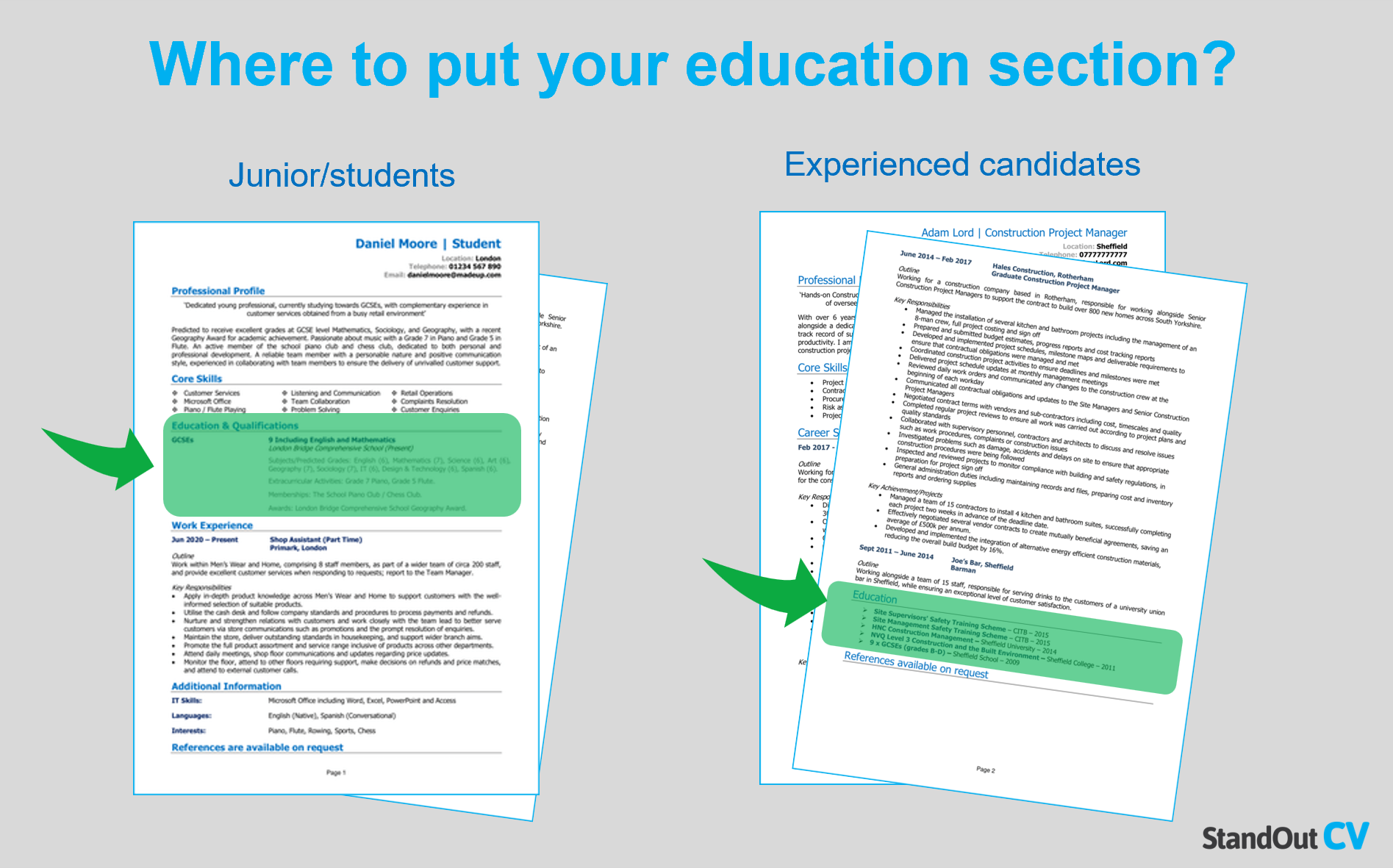
- Little/no experience – If you’re just leaving education and therefore don’t have a lot of experience behind you, place your education section nearer the top of your CV, under your personal profile . Be sure to go into plenty of detail because, at this point in your career, your academic record will receive more attention, and employers will need lots of info to be persuaded to hire you.
- Experienced candidate – If you’re a more experienced candidate who has gained skills and knowledge through past positions, your employment history takes precedence. In this case, your education section should go under your employment section because employers are likely to be more interested in your real-world experience – although they will still value your education.
CV templates
What to include in your education section?
This section should outline your formal education, qualifications and certificates in reverse chronological order. Here’s an overview of what this might include:
- Degree – As a university graduate, you need to include your degree , and if you’ve got post-graduate qualifications, your most recent degree must come first. To do this, include the name of the university, the title of your degree, the dates you studied there and the grade you received. You might also wish to include details of any relevant modules you studied
- A-levels – If you took A-levels at college, you probably completed three to four subjects. Be sure to include the name of your college, the dates you studied there and the subjects you completed.
- Vocational qualifications – School or college aren’t the end of the road for your education but if you chose not to study a degree, you may have obtained other vocational qualifications. If so, you need to include these too. Follow the same formatting rules by including the name of the institution, the qualification and the date you achieved it
- GCSEs – Listing your GCSEs can be trickier as there are often more of these. So if you have lots of GCSEs, include your school name, the years you were there and then abbreviate your list of subjects. For example, ‘10 GCSEs including maths and English’
- Mandatory certificates – There might be mandatory training you need to undertake to get a job, for example, health and safety certificates. In this case, you should include these in your education section, listing the level of certification, name of the course and date you received it. You might also wish to include the name of the accrediting body if they are well-known in the industry.
Education section examples
Now you have a better understanding of what could be included in your education section, let’s take a closer look at how these should be written with some examples.
School leaver
As a school leaver hoping to land a job, it’s likely that your GCSEs are going to be your highest level of qualification.
When adding these to your CV, you should include the full name of your school and the dates you attended. Underneath this, you can begin to outline your GCSEs.
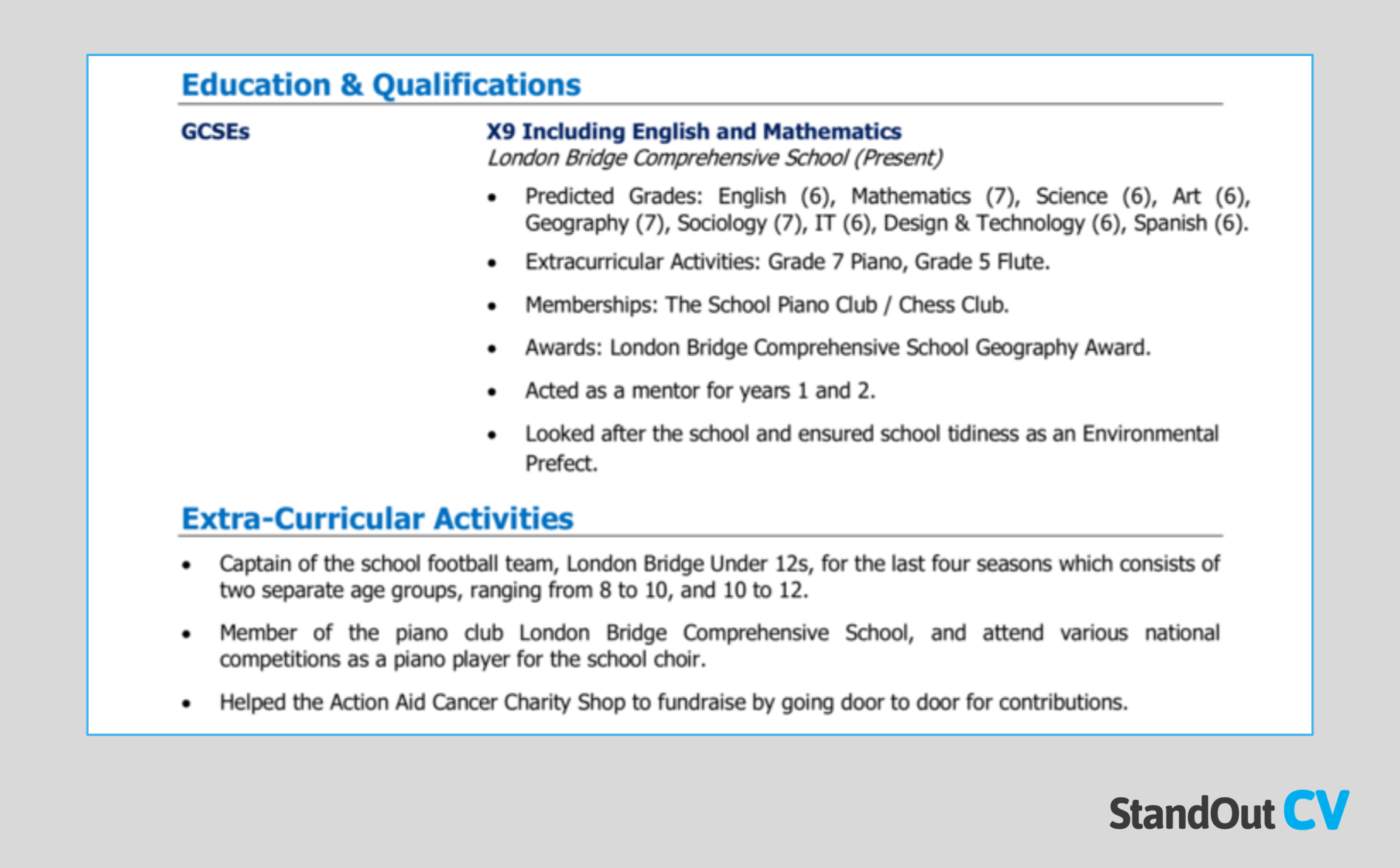
Baxton Hill High School – 2014 to 2019 10 GCSEs
- English (A) | Language & Literature
- Maths (A) | Achieved best coursework award
- Biology (B)
- Physics (B)
- Chemistry (B)
- Information Technology (A) | Specialised in Microsoft Office
- Geography (C)
Extracurricular activities and achievements:
- Grade 5 piano
- Grade 3 flute
- Captain of the school hockey team
- Voted ‘Most Spectacular Sportsperson of the Year’ in Year 10 and 11
Because this makes up the basis of your educational background, you can afford to outline all of your subjects and grades in more detail.
You could also include any awards or clubs in which you participated, it might look a little something like the above.

College leaver
As a college leaver, you will still need to include your GCSEs, particularly if they are relevant to the role you’re applying for, but your main focus should be on your more recent A-Levels.
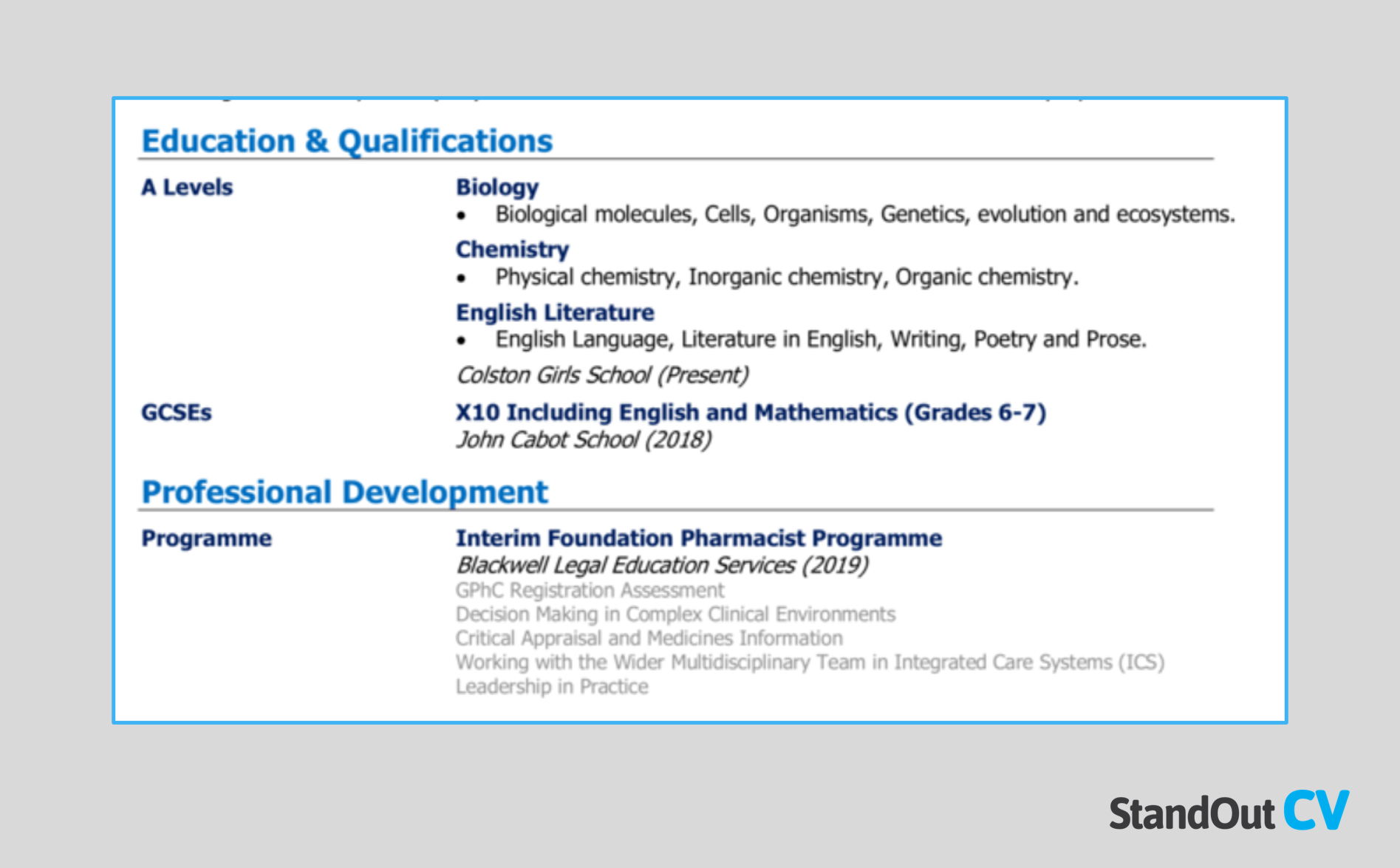
London Central College – 2019 to 2021 3 A-Levels
- Photography (A) | Including wildlife photography project and paper
- English Language (A) | Studying “Of Mice and Men”
- Graphic Design (B) | Completed a complete product design of a toy package
Achievements
- Practical experience in Adobe Photoshop, Illustrator and InDesign
- Proficient using DLSR camera, as well as experience developing film in the darkroom
- Achieved A grade and finished in top 10% of my class for print media and photography project
Baxton Hill High School – 2014 to 2019
10 GCSEs grade A to C including English, Maths, IT and Art
As you study fewer subjects at A-Level (typically three to four), you can give a bit more detail about each subject, your grades and anything else that could boost your application.
For example , you could outline particular projects that you were proud of or some of your key achievements. In this case, your education section might look a little something like the above.
Experienced professional
After college, or perhaps even during your time at college, you may have chosen to undertake a vocational qualification as a way of boosting your skills and gaining some real-world experience. This could be in the form of an NVQ , BTEC or a diploma.

City & Guilds NVQ (L1) in Hospitality Skills – 2020 – 2021
- Learning to maintain a safe, hygienic and secure working environment
- Working with the team to prepare, cook and safely store food
- Industry-standard training in kitchens and restaurants around London
London Central College – 2018 to 2020
A-Levels including English Language (A), Business Studies (A) and Food Science (B)
Baxton Hill High School – 2013 to 2018
10 GCSEs grade A to C including English, Maths and Food Technology
So although your experience in the workplace will likely take precedent on your CV, your education section is still important, and you need to give a little more detail about your vocational qualifications.
You can still include any A-Levels you have as well as GCSEs, but these should be kept to brief summaries like the above.
Recent Graduate
As a recent graduate , your degree is going to be one of your key selling points, particularly if you don’t have a great deal of work experience behind you.
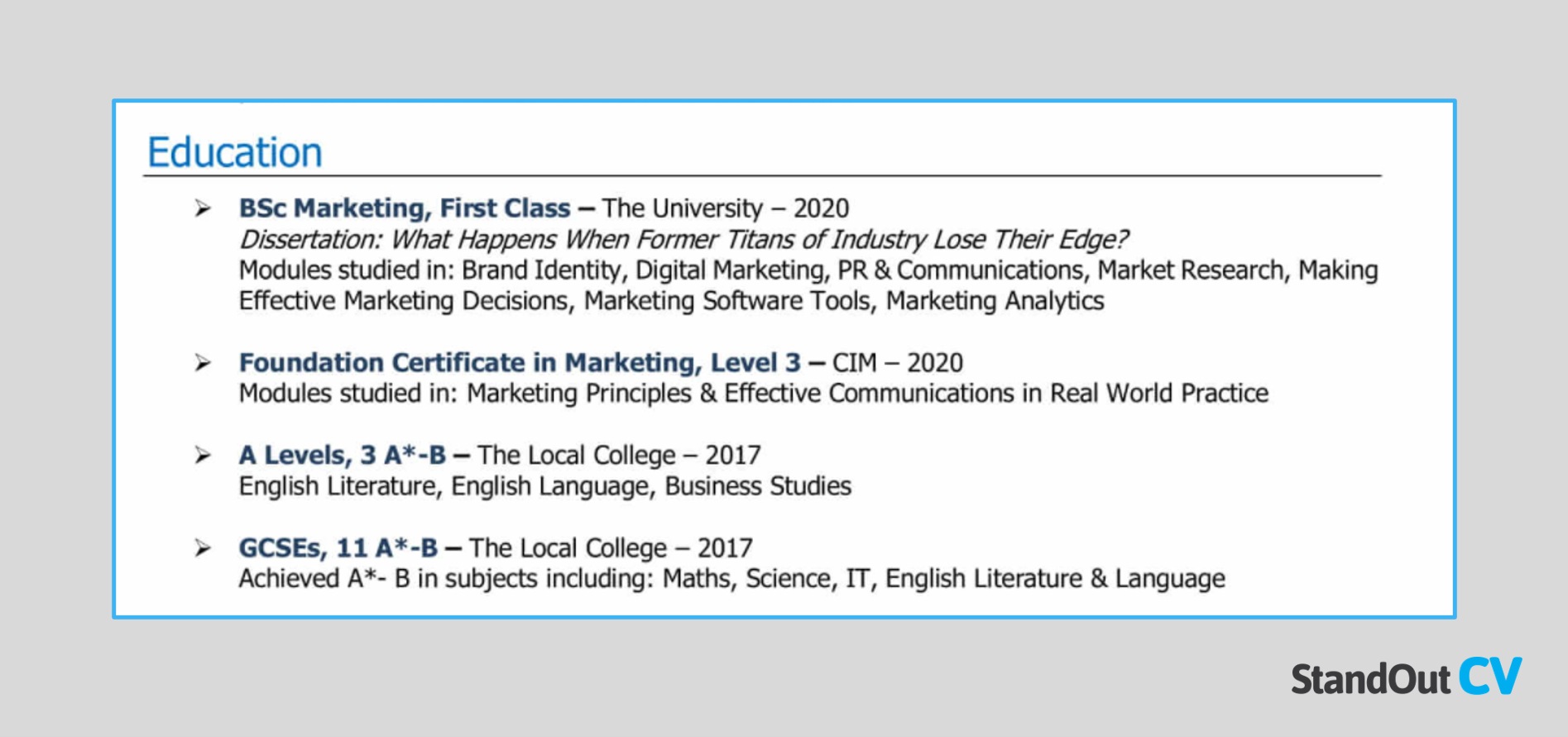
BSc (Hons) Computer Science – Queen Mary University – 2018 – 2021 Final grade: 1st Class
- Modules including: Big data processing, data mining, Artificial Intelligence (AI) and algorithms and data structures
- Achieved a 1st (96%) for my dissertation on ‘issues with privacy and security when dealing with big data’, coming top of my class
- Gained practical experience in software engineering, procedural programming and data mining
A-Levels including Information Technology (A), Business Studies (A) and Graphic Design (B)
10 GCSEs grade A to C including English, Maths and IT
You will still need to include your A-Levels and GCEs, but these sections don’t need to contain as much detail. Your focus should be on showcasing your degree, the key skills you gained and any achievements during your studies. You might also include any modules you studied that are relevant to the role.
The format should include the type of degree, as well as the full title, and you should include any honours along with your final grade.
Experienced Graduate
If you are a graduate with experience, whether that is because you left university a few years back or because you undertook a work placement as part of your course, this section can be less detailed.

BA (Hons) Digital Marketing – Queen Mary University – 2018 – 2021 Final grade: 2:1
- Modules including: Interactive media technologies, media streaming and the Cloud, programming for data analysis and personalising the digital experience
A-Levels including English Language (A), Media Studies(A) and History (B)
10 GCSEs grade A to C including English, Maths and Media Studies
You should still include your degree, A-Levels and GCSEs as shown above, but you can give fewer details, as the focus will lie with your real-world experience.
That said, this section should follow a similar format, including the type of degree and the full title, the university you attended and your final grade. In this case, your education section might look something like the above.
How to write your education on your CV
No matter what stage you’re at in your career, knowing how to structure , format and effectively showcase your education on your CV is critical. To help you get it right, we have pulled together some of our top tips for nailing your education section.
Adapt for your experience level
As we mentioned earlier, you should always include your educational experience in reverse chronological order, listing your most recent qualifications first. You also need to adapt this section depending on your level of experience.
You can see in the examples we’ve given above, if you’ve got work experience behind you, then you can afford to be more sparing on the details. However, if you don’t have a lot of relevant experience to speak of, you should go more in-depth about your key subjects, skills and achievements in your education section.
Only include relevant qualifications
As with every section on your CV, you need to make sure that you’re only providing information that is relevant to the role and employer. Otherwise, you could be wasting valuable space.
The more experience you have behind you, the less detail you need to give in terms of your education. Therefore, you can leave out any qualifications that aren’t relevant to the role. This is the reason you don’t need to list all 10 of your GCSEs unless this is the only educational background you have.
The same applies when you include your modules, achievements or extra-curricular activities. If they aren’t relevant to your career path, you are better off saving that space for something that is.
Use bullet points and break information up
Finally, it can be helpful to use bullet points throughout your education section, particularly when going into more detail about your experience. This is because bullet points can improve the format, make your CV more readable and help draw the recruiter’s attention to the details that matter the most.
Remember, you only have a few seconds to grab their attention and impress them, so you need to make it as easy as possible for the reader to find the key information quickly and effortlessly.
Free CV maker.
Make a standout curriculum vitae in minutes with our free CV templates.

Template IDs
(To pull in manually curated templates if needed)
Orientation
(Horizontal/Vertical)
( Full, Std, sixcols )
(number of templates to load each pagination. Min. 5)
Most Viewed
Rare & Original
Newest to Oldest
Oldest to Newest
(true, false, all) true or false will limit to premium only or free only.
Create a custom curriculum vitae using free CV templates.
A curriculum vitae offers an excellent way for job seekers to showcase their academic background, career experiences, and skills. Now, you can customize your CV using professional layouts and graphics from Adobe Express. Print, email, or share your CV digitally with potential employers. Select a template to get started and see how easy it is to create an impressive CV. No design experience required.
Discover even more.
Business Card
Cover Letter
Profile Picture
LinkedIn Banner
Online Portfolio
How to make a CV.

Launch Adobe Express.
Stand out with branding., publish and share., an easy-to-use cv builder..
Showcase your breadth of experiences while letting your personality shine when you upload your own logo and apply a color scheme to your Adobe Express CV template of choice. You’ll even get curated font recommendations for your project, so you can be confident your design looks good. In minutes, you’ll have a polished document ready to be printed or sent out via email. Go back anytime to edit or update your CV as your professional experiences grow.

Free CV templates for every possible career.
Build a CV in any style for any industry with the free Adobe Express editor. Then, duplicate your CV in the same project and use it as a template to make a matching cover letter or resume. When you’re finished, save your file as a PDF, JPG, or PNG to publish on your website and LinkedIn, or email it to the recipient in mind. You can print and mail it out, too.
Showcase your line of expertise.
A good CV allows you to promote yourself to potential employers and show them why they should hire you. Making a custom CV design lets you highlight skills or experiences that help you stand out and make a good first impression. The Adobe Express CV maker helps you create a CV in just a few clicks, no prior design experience necessary. Whether it’s for a part-time job or a full-time position, you can use the Adobe Express CV maker for free to create a CV online.
Impress recruiters with an up-to-date CV.
When writing a CV, include your general contact information and references. Also include important sections, such as your education and experience, honors or awards, publications and presentations, relevant professional activities, and skills. Format your CV in a way that makes it easy to read and carefully check your CV for any typographical or spelling errors. The online CV maker from Adobe Express gives you plenty of customization options so you can create a CV that best fits your needs quickly and easily.
Create easier with the Adobe Express CV maker.
With the Adobe Express CV, you can make your own CV design in minutes, no creative experience required. Choose from tons of CV templates to help you bring your CV vision to life. Drag and drop icons, graphics, and shapes to liven up your custom CV using simple editing features. If you plan on sharing your CV digitally, you can even add animated effects to any element and make your design pop. Making a CV from start to finish couldn't get easier with Adobe Express. All you need is an idea to get started.
Frequently asked questions.

IMAGES
VIDEO
COMMENTS
Keep your education section positive and proactive. When creating a resume with no education to list, highlight the ways you've taken the initiative to learn and grow in your field rather than focusing on an incomplete or interrupted education. List any job-related training you've completed, either through your own initiative or your company's ...
How to write a resume with no education: a step-by-step guide. Writing a resume with no education will take some effort, but by following these steps, yours will be done in no time. Here is a step-by-step guide to writing a resume with no education. #1. List your contact information. Your contact information should be right at the top of your ...
As he worked to land a senior leadership role, we knew this experience had to be front and center on his resume. We included it in the summary section and spelled it out with clarity in his experience section. Here's how the summary bullet read: A marketing leader with authoritative knowledge of youth culture.
Sprinkle in additional power words and keywords (taken from the job description) to better articulate your competencies. Beef up your accomplishments and duties and re-check the texts for any grammar and formatting mistakes. Pro tip: Use our free resume builder to create a well-formatted resume 2X faster.
Here's an example of how to list an unfinished degree on your resume: SYRACUSE UNIVERSITY - Syracuse, NY. 2017-2019. If you took some courses related to the job, include those under your university information. You can list them by individual courses taken or by number of credits earned in a certain area of study.
Resume summary and objective examples for a no degree resume. Software engineer with five years of experience in Python, C++, and Java. Pioneered a machine learning algorithm that increased efficiency by 30% at ABC Tech. Seeking to apply my technical proficiency to a challenging new role.
If your experience is stronger than your education, place your work history before education on your resume, and write about your career achievements, track record of results and industry knowledge. Include a detailed listing of your accomplishments throughout your career. Prove that your work performance has been outstanding and you would be ...
It's the easiest part to get right, just keep it short and to the point. In your contact information section, mention the following: First and Last Name. Phone Number. E-mail Address. A link to a professional profile (e.g. LinkedIn) or personal webpage (if you have one) Make sure to use a professional-sounding E-mail.
2. Add Education to a Resume with No Experience. Maybe you're writing a resume for a high school student with no work experience. Or you're in college and you're looking for a part-time job so you can stop asking your parents for money. Or perhaps you're writing a resume for a first job.
10 Tips for Writing a Resume With No Experience. We've gathered a few tips on how to write a resume with no experience to help you jump that first hurdle. 1. Highlight Transferable Skills. Just because you weren't on the payroll doesn't mean your skills are less valuable.
CV with no experience example - 2. The CV examples above show you the basic format of a CV, and the type of content you can include when you have no experience. I will now walk you through how to produce your own effective CV. You can watch the video below, or read trough the rest of the guide on this page.
Let's start with the basics— what to include in your resume education section: Your most recent degree (or education in progress) The name of your school. Location of your school. Dates attended and graduation date (or expected graduation date) Your GPA (only if it's above 3.5) Your field of study and degree major.
Here's how to write a resume when you have no formal work experience, step-by-step: Build My Resume. Our free-to-use resume builder can make you a resume in as little as 5 minutes. Just pick the template you want, and our software will format everything for you. 1. Choose the best format and style for your resume.
The best approach to writing a resume when you have no formal education-meaning college education-is to focus on what you do have. Perhaps, you may still be in high school, have just graduated from high school, or have completed a GED. In any event, you need to create a resume, as all jobs that you will apply to require a working resume.
Listing your education on a resume should be strategic and concise. It's essential to highlight the most relevant and recent educational experiences that align with the job requirements. Focus on providing key details such as the degree earned, institution name and graduation year. Emphasize any honors, scholarships or academic achievements ...
Choose clear, legible fonts. Go for one of the standard CV typefaces: Arial, Tahoma, or Helvetica if you prefer sans-serif fonts, and Times New Roman or Bookman Old Style if serif fonts are your usual pick. Use 11 to 12 pt font size and single spacing. For your name and section titles, pick a 14 to 16-pt font size. 2.
Examples of skills to put on a resume with no experience. OK, you understand now that your resume should be tailored to each job. But to get you started, here are 16 great skills to put on a resume with no experience—from soft to hard skills. General and behavioral skills. Need some key skills to put on a resume for an entry-level position?
Here's how to prepare to write a curriculum vitae effectively. First, review the job description closely. Make a note of all the requirements and "nice-to-haves.". Then make a list of your: Professional experience, including employers' names, dates of hire, locations, job titles, and responsibilities.
The goal of a first job resume is to demonstrate your value as an employee and show employers why hiring you would benefit their company: 1. Review the job description. Carefully review the job description and note any specific skills you have or requirements you can fulfill.
How to write an education section on a CV. Here are six steps you can follow to write the education portion of your CV: 1. Include the name and location of any schools attended. Providing the name and location of the school you attended provides the hiring manager or reader with an understanding of your level of education.
Use a (Free) Resume Template 16 Examples of Education on a Resume #1. High School Education #2. General Education Development #3. Associate Degree #4. Certificates #5. Undergraduate Degree #6. Graduate and Postgraduate Degrees #7. Unfinished Education FAQs Key Takeaways. Share this article.
1. Name of institution. You should always write down your school/university/college name in the education history CV. 2. Location. Simply include the city and country where the institution is located. 3. Type of degree obtained. State which degree/certification you received.
As a school leaver hoping to land a job, it's likely that your GCSEs are going to be your highest level of qualification. When adding these to your CV, you should include the full name of your school and the dates you attended. Underneath this, you can begin to outline your GCSEs. Example 1. Example 2.
Writing your first CV is a major step in any new professional's career. This is your opportunity to showcase why you're an excellent candidate and how you've prepared yourself to succeed in your first job. When you're entering the job market for the first time and creating a CV with no work experience, you'll want to focus on other ...
Referencing scholarships. You could list the details of any scholarships or awards you receive as part of your studies in the education section of your CV. This includes the year and any explanatory detail you feel might help an employer understand what the commendation reflects. Example: BA (Hons), 1st Class.
CV example for school leaver Consider using the CV as a guide when creating your own document: Anna Evans [email protected] 01234 567890 Professional summary Following the recent completion of my GCSE studies, I am looking for an entry-level full-time role in accounting. Applicable strengths include an A in Maths and previous work experience at a local diner.
A good CV allows you to promote yourself to potential employers and show them why they should hire you. Making a custom CV design lets you highlight skills or experiences that help you stand out and make a good first impression. The Adobe Express CV maker helps you create a CV in just a few clicks, no prior design experience necessary.